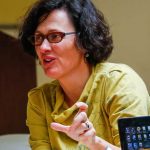The global open data movement has taken shape and evolved significantly in the course of the last decade. In Canada, open data programs from federal, provincial and municipal governments have become increasingly expansive and more sophisticated. Our unique vantage point allows us both to look back and to look forward to offer informed insights into what the future of open data may hold. Geothink has paid significant attention to the central role played by open data as an interaction space between government and citizen. As we approach the end of this five-year partnership research project we are well positioned to interrogate the question: What is the future of open data?
On Tuesday, November 14 at 12:00 (EST), Geothink.ca hosted its second monthly Geothink&Learn video conference session on the topic of The Future of Open Data. It highlighted Geothink’s unique interdisciplinary perspective and included a myriad of ideas from our faculty, students and partners. (Catch a recording of the session below along with a transcript of the written question and answer session discussion.)
The convener for the session was Geothink Co-Applicant Peter Johnson, associate professor in University of Waterloo’s Department of Geography and Environmental Management. Panelists included Geothink Partner Jean-Noé Landry, executive director of Open North; Geothink Partner Marcy Burchfield, executive director of the Neptis Foundation; Geothink Co-Applicant Pamela Robinson,associate professor in Ryerson University’s School of Urban and Regional Planning and the associate dean for Graduate Studies and Strategic Services; and, Geothink Co-Applicant Teresa Scassa, Canada Research Chair in Information Law at the University of Ottawa.
A question and answer session followed after presentations concluded. The five panelists briefly introduced their research and then reflected on the future of open data—particularly in the context of the work of our partners.
1. From Steve Coutts: With regards to “data deserts” (especially where marginalized populations are concerned), is citizen co-creation/collection of data a natural evolution of the open data movement?
From Muki Haklay: A follow up on the question about data deserts and data poverty, where will they have the resources, technical abilities etc. to produce data? We just discovered a case where due to agreement in the planning stage an air quality station was installed in a poor area, only to leave the data for 8 years without examining it…
From Pamela Robinson : Steve – great you are here – good questions – when your MRP is done, we can share it widely with the geothink.ca team. I know these issues are ones you care a lot about and will do great work on 🙂
From Jennifer Barrigar: worried that expectation of citizen co-creation/collection as response to data deserts may become form of responsibilization rather than useful remedy
2. From Majid Hojati: What are the main protocols and standards to share data? What are the limitations of sharing these data? I mean people’s’ privacy and so on, and in the other side the data which are shared could be misused.
From Ayse Giz Gulnerman: Do you think, social media as a sub title of Volunteered Geographic Information may contribute to open data? Could it take a part of open data community?
3. From Muki Haklay: A question that is emerging – did Geothink capture a “municipal open data” moment that emerged and is now going down? So maybe because of the belief that data is a resource, plus privetisation (e.g. Google/Toronto) and as a result we have less open data?
From Renee Sieber: Did we capture a moment in open data; I wonder if we captured a moment in openness and we’re returning to closed and proprietary.
4. From Majid Hojati: what is the best method to share data continuously, I think these data must be updated regularly, it needs a high level of platforms to manage, share and update those data, there must be some standards for these platforms when is comes to geo-data spatially.
[Answered orally during session.]
5. From Daniel Paré : It’s great hearing these perspectives. I’d suggest that it’s the average citizen, CSO, and other actors who are not part of the the OD/OG communities. While some of these actors may be on the margins of OD/OG discussions a vast majority are not actively involved precisely because they don’t see the direct relevance and usefulness of OD/OG to their activities and everyday lives. My question is: How do we get the perceived relevance and usefulness of OD/OG to expand beyond the bounds of OD/OG communities to wider CSO actors and individual citizens? I ask this, in part, because the latter is part of the sustainability conundrum – ie., it’s great to make data open and available. But if that data is not being used, at what point do governments start viewing the maintaining and sustaining OD/OG as a non-economically viable resource drain?
[Answered orally during session.]
6. From Majid Hojati: but if there was not any standards to what to be shared it would not be easy to mange them? What platforms could be used to manage them?
[Answered orally during session.]
7. From Jon Corbett : When we think about marginalized populations acting as the principal agents in data collection, are they in turn expected to open this data? How does this work with sensitive cultural data?
From Muki Haklay: Jon Corbett’s point is very important – with marginalised communities it’s close by default not open
From Renee Sieber: open data has a definite first world bias; people can only benefit from opening data. This isn’t necessarily the case with first nations
From Renee Sieber: Opening up their data can potentially harm them. Data is power. We don’t always realize that we have so much power that we can liberally give away some of that power through data
8. From Majid Hojati: I think these data could also be used against governments, isn’t there any kind of barriers by governments to share data?
[Answered orally during session.]
9. From Renee Sieber: In a future of AI and smart cities, will we have to educate the public on the need for openness? These days, many citizens may see government as “Don’t bother me with engagement – Can’t you just track me and figure out what services I want?”
From Pamela to Renee Sieber: Yes! This is fundamental and a big part of my research. Civic literacy in the smart city is really important.
From Daniel Paré: I don’t know of many citizens who are good with the idea of being tracked by government
Form Pamela to Daniel Paré: Daniel – people click through the terms of service to get free wifi all the time in exchange for sharing their location/data/etc.. Is this different?
From Daniel Paré : I take your point Pamela, but I’m to sure pop make the connection i.e., not associating free wifi with giving away info. Seem to be comfortable with perceived indirect surveillance as opposed to perceived direct surveillance
From Pamela to Daniel Paré: To build on your question: in the smart city how do we signal that people’s data is being collected
From Jennifer Barrigar: Renee/Dan i think there’s a weird balance….people don’t want to be tracked by govt, but at the same time get really frustrated that they have to contact multiple govt departments to change address –> if i tell you once, why do i have to tell you again?
From Daniel Paré: Agreed, Jen. Tiered access to data also linked to quality of data?
From Renee Sieber: Jen, I wonder if the future of open data is Estonia, where all gov depts are linked. Met an Estonian expat from WorldBank who lauded the integration: “Passport Office needed a photo. My doctor had a recent one and he just sent it along.” He thought it was wonderful; I thought it was creepy.
From Jennifer Barrigar: Renee — if nothing else, i think that requirement for consent may address the way people relax into a presumptive notion of privacy, and then feel shocked/smacked in the face when the contextual integrity of that privacy (to invoke Nissenbaum) is suddenly violated….
From Renee Sieber: Consent, yes but it requires ppl read ToS [Terms of Service].
From Jennifer Barrigar: Currently, yes….but hopefully w/ partnerships and new models we can also re-examine meaningful consent and privacy
From Jennifer Barrigar: Renee, I’m not inherently opposed to “collect once, use many” when appropriate/meaningful understanding and consent is attached….but I really think that clarity and explicit notice is important.
From Renee Sieber: which also requires challenging biz models that demand a lack of consent in order to function.
From Jennifer Barrigar: Renee, I don’t disagree…but again, I get concerned when we talk about people not giving consent – I think blaming the “stupid user” rather than examining the models within which they’re participating can take us down the wrong paths.
Download a PDF of this event to share.
When:
Tuesday, November 14, 2017 at 12:00 PM [NOW CONCLUDED]
Where:
https://zoom.us/webinar/register/WN_hpd7ijNlRzGBUjc5b-a5kw
After registering, you will receive a confirmation email containing information about joining the webinar.
Convener:
Peter Johnson
Moderator:
Sonja Solomun
Panelists:
 Teresa Scassa: Reflected on how the changing nature, value and applications for data may affect the future of open data. She will also discuss the challenges of municipal data ownership in the smart cities context and the potential impact on open data.
Teresa Scassa: Reflected on how the changing nature, value and applications for data may affect the future of open data. She will also discuss the challenges of municipal data ownership in the smart cities context and the potential impact on open data.
 Marcy Burchfield: Spoke on what does the future of open data look like when government is challenged to keep pace with technological change. Experiences based on the use of open data on the Neptis Geoweb platform.
Marcy Burchfield: Spoke on what does the future of open data look like when government is challenged to keep pace with technological change. Experiences based on the use of open data on the Neptis Geoweb platform.
 Jean-Noé Landry: Spoke on the state of open data, how the open data movement has matured over the years and some emerging trends. He will touch upon some key points in open data’s maturation, such as its more recent focus on standardization and data culture. This has advanced the open data movement beyond simple data provision. More recent trends, such as context driven data engagement models (going beyond simple push and pull of data), links to sustainable development, and indigenous data sovereignty will also be covered.
Jean-Noé Landry: Spoke on the state of open data, how the open data movement has matured over the years and some emerging trends. He will touch upon some key points in open data’s maturation, such as its more recent focus on standardization and data culture. This has advanced the open data movement beyond simple data provision. More recent trends, such as context driven data engagement models (going beyond simple push and pull of data), links to sustainable development, and indigenous data sovereignty will also be covered.
 Peter Johnson: Despite the general enthusiasm for the expansion of government open data programs across North America, many programs continue to exist largely as a static repository of data. This situation demonstrates the challenges government faces with not only launching an open data sharing platform but maintaining, growing, and integrating open data into government functioning and processes. When considering the Future of Open Data, we need to think about the future of the open data portal and its role as but one component of an open government program.
Peter Johnson: Despite the general enthusiasm for the expansion of government open data programs across North America, many programs continue to exist largely as a static repository of data. This situation demonstrates the challenges government faces with not only launching an open data sharing platform but maintaining, growing, and integrating open data into government functioning and processes. When considering the Future of Open Data, we need to think about the future of the open data portal and its role as but one component of an open government program.
 Pamela Robinson: How do we characterize the working relationship between open data and open government? In the beginning the two were tightly coupled. But now, as open data and open government efforts evolve, what kinds of trends are we observing?
Pamela Robinson: How do we characterize the working relationship between open data and open government? In the beginning the two were tightly coupled. But now, as open data and open government efforts evolve, what kinds of trends are we observing?
